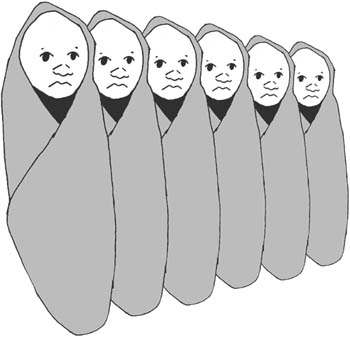![[Metroactive Features]](/features/gifs/feat468.gif)
[ Features Index | Silicon Valley | Metroactive Home | Archives ]

Techsploits Baby Makers By Annalee Newitz DO YOU EVER GET so tired of hearing the same tiresome comments about your lifestyle that you just snap and say something a little too truthful? Recently, I was at a lovely party full of interesting people who had all brought their kids. I like kids--they're usually honest and aren't afraid to smear chocolate on their heads. But because my partners and I didn't have children, I found myself in several conversations in which I was told, "When you have kids, you'll ..." Finally, after hearing the phrase one too many times, I said casually, "I'm not going to have kids." "Well, you should," the person with whom I was chatting replied. "I've talked to a lot of people, and the ones who don't have kids are usually unhappy." "I'm happy," I said. "I like kids, but I don't want any of my own. I've been fixed." "No," the person asserted. "You're broken." This was hardly the first time I had been told that my childlessness was a sign of damage. Most people believe, without ever questioning why, that having children is good--no matter what the circumstances. And that's why I'm glad to hear that the Raelian cult wackos at Clonaid have just announced the birth of the first human clone. I can't imagine a better example of the sort of perverse, creepy shit that results from people feeling like they must reproduce or be, in the words of my party pal, "unhappy" and "broken." Given the cultural condemnation childless people face, nobody should be surprised that they're willing to be all kinds of stupid to get some offspring. They'll even use highly experimental procedures that have had mixed results in animal tests. Don't get me wrong: I'd be perfectly happy for people to clone themselves every five minutes if there were ample evidence that their offspring would be healthy. But Dolly the cloned sheep has suffered problems as she's aged. Because cloning procedures are so new, there have been few opportunities to gauge how well other clones like steers or CC the cat will survive long-term. We don't know enough about reproductive cloning yet to be bringing little cloned humans into the world. I hope that these Clonaid babies--if indeed they are truly clones, a subject about which there is still some debate--will grow up healthy. But what if these clones' parents, so eager to make themselves "not broken," consign their children to shortened lives or worse? The right wing's obsession with family values has probably helped foster an atmosphere in which people are so desperate to become parents that they are driven to cloning. This is especially ironic because, of course, the right wing is also ferociously anti-clone. Admittedly, new Senate Majority Leader Bill Frist may represent a turnabout in conservative opinions on cloning. But for now, the Bush administration is still aligning itself with religious conservatives and abortion foes in the debate over all things clone-related. And this means the government's opinions on cloning are about as thoughtful as Clonaid's. Witness the recent embarrassing scuffle between administrators at Stanford's new Institute for Cancer/Stem Cell Biology and Dr. Leon Kass, head of the president's Council on Bioethics (PCB). Stanford's Dr. Irving Weissman--bless his bio-geeky little heart--made the mistake of assuming that the council would support his institute's effort to conduct cutting-edge research with stem cells to stop cancer. That's where he was wrong. Why? Remember that we get stem cells from a process called therapeutic cloning. And all cloning, according to the PCB, is bad. Of course, therapeutic cloning--despite the word "clone"--isn't baby-making a la Clonaid. It's a fairly complicated process in which biologists create a couple of embryonic cells from a human or other creature and use them to make stem cells. No babies involved. No sheep. No kitties. Just a few cells that incidentally might be used in a therapy that gets rid of your baby's cancer. Despite the fact that there is a vast scientific and ethical chasm between therapeutic and reproductive cloning, Kass has stated that "cloning" is the reason why the PCB will not support Stanford's Institute for Cancer/Stem Cell Biology. In fact, the PCB prefers to use the epithet "human embryonic cloning" to refer to the stem cell growing process used at Stanford and elsewhere. According to The New York Times, this is an epithet the PCB gets from anti-abortion activists, who want scientists to own up to the fact that they're "killing potential babies" when they experiment with stem cells. Meanwhile, Stanford reps say they prefer to call the process they use to create stem cells "nuclear transplantation (or transferral) to produce human pluripotent stem cell lines." Not exactly a snappy comeback, unfortunately. The truth is never easy to pronounce, but that doesn't mean it isn't worth fighting for.
Annalee Newitz (fixed@techsploitation.com) is a surly media nerd with a lot of friends who have babies--and, for all she knows, some of them might be clones.
Send a letter to the editor about this story to letters@metronews.com. [ Silicon Valley | Metroactive Home | Archives ]
|
From the January 1-8, 2003 issue of Metro, Silicon Valley's Weekly Newspaper.
Copyright © Metro Publishing Inc. Metroactive is affiliated with the Boulevards Network.
For more information about the San Jose/Silicon Valley area, visit sanjose.com.